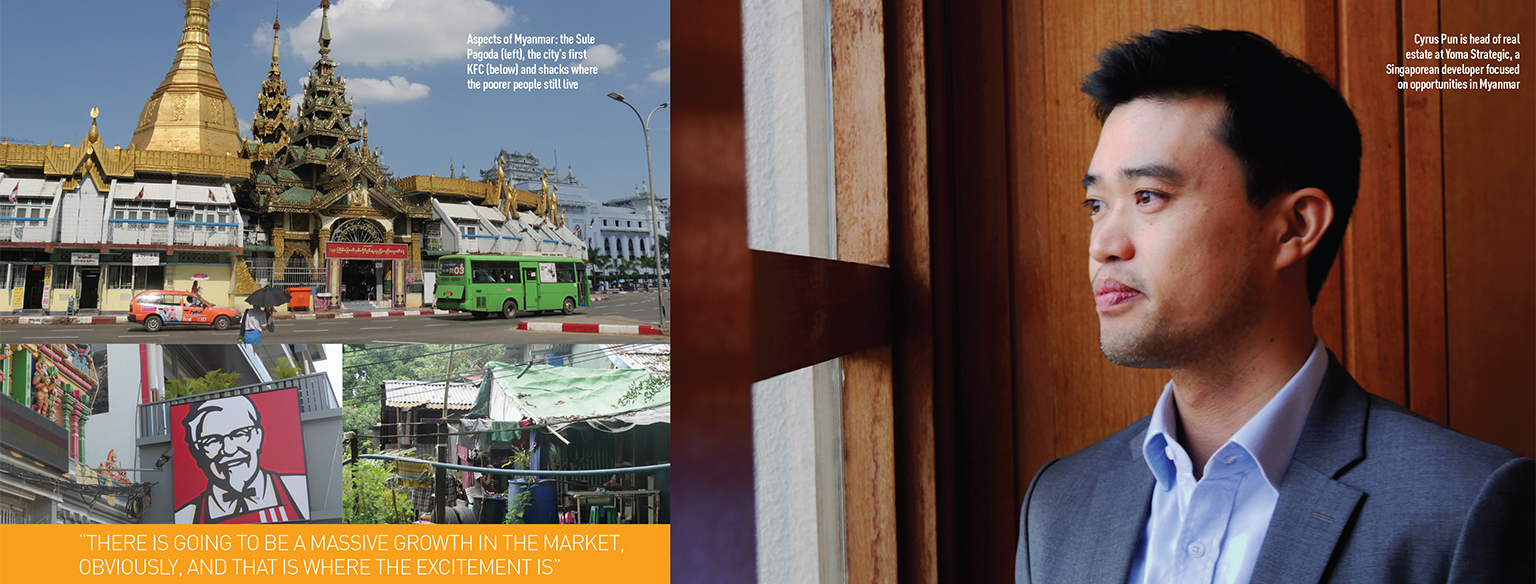As Myanmar finds its feet under its new government, so too must real estate investors and developers keen to explore the market. David Doyle meets Cyrus Pun, head of real estate at Singapore-listed developer Yoma, which is doing just that
 Stand at the crossroads of the Bogyoke and Sule Pagoda roads in central Yangon and the collision of Myanmar’s history and emerging modernisation is clear.
Stand at the crossroads of the Bogyoke and Sule Pagoda roads in central Yangon and the collision of Myanmar’s history and emerging modernisation is clear.
Looking south, a golden Buddhist pagoda dominates the main roundabout, reflecting the humid heat onto an endless stream of taxis. Across the road, the old Sri Kamichi Hindu temple jostles for sunlight with Myanmar’s brand new, and first, KFC.
And behind you, next to the Aung San Bogyoke market – named after the father of Myanmar’s democracy leader Aung San Suu Kyi and the man credited with giving the country its independence – is the Landmark Development site, a $300m (£207m) project being built by Yoma Strategic, a Singapore-listed real estate developer eyeing emerging opportunities in the country.
On one hand it is an exciting time for real estate companies looking for opportunities in Mayanmar. But the country is at its own crossroads, politically and economically. The November election was a landslide victory for Aung San Suu Kyi’s National League for Democracy but the months that followed have been dominated by political wrangling over who would become president when the first freely elected parliament in Myanmar for 50 years held its opening session at the start of this month. Suu Kyi is barred from assuming the position, but she has been very clear that she intends to run the country anyway, saying she would be “above the president”.
Cyrus Pun, head of real estate at Yoma, is confident that after Myanmar’s first free and fair election since military rule, the country is now on the right course.
“I believe everyone has a strong interest in maintaining the reform process, maintaining the open-door policy, maintaining that path they have already set,” he says. “Everyone has a vested interest in that, and that is also in line with the wish of the people, so no leaders want to rock that boat. We feel very positive that as far as business is concerned, we will stay on the right path.”
But for property developers in Myanmar, the road has its potholes. The frontier market lacks experience of international-standard developments. Construction materials such as concrete and steel often have to be imported from other Asian markets, at higher cost, and the finance sector is still finding its feet.
And for foreign companies, the difficulties increase. Although Myanmar’s government has brought in foreign investment laws in a move to open up the country, overseas developers still need a local partner if they have any hope of being taken seriously.
It is in this context that Yoma is in a privileged position. The company sits within a family of businesses largely controlled by Pun’s father, Burmese-born business tycoon Serge Pun.
Also in the business family is First Myanmar Investments, a Burmese public company. At the top of the tree is Serge Pun Associates, which is the majority owner of FMI, while Serge Pun is the largest shareholder in Yoma, owning 37% of the firm.
Industries from agriculture to balloon rides over the tourist hotspot of Bagan have been divided between FMI and Yoma Strategic. But the one sector they collaborate on is real estate.
FMI acts as the local partner, often owning the leases on development sites. And Yoma, using its Singapore listing, can bring in the money.
“In the last few years we have raised about S$370m (£183m) which is by far the largest fundraising for any Myanmar company on the international markets,” says Pun.
So far, capital has been invested in developing major residential projects including the 9,000-apartment Star City development and the Pun Hlaing Golf Estate, both in Yangon.
Pun says Yoma Strategic has sold about 2,000 apartments in the past four years at such developments.
But the company, which has net assets of S$642.6m, saw its revenue fall by more than 50% in the second quarter of the year (to 30 September 2015) due to a slump in residential sales.
Yoma chief executive Melvyn Pun attributed the decline to a “wait-and-see” attitude by buyers in the run-up to the election. “We are cautiously optimistic that market sentiments are likely to improve in the coming months with the election being conducted smoothly,” he said at the time of the results.
But it is not just a return to stability that is giving Yoma reason to stay positive. With Myanmar’s banking sector in its infancy and debt unavailable, it is not uncommon to hear of people turning up to buy apartments with bags of cash. But an improved finance sector could change this.
“We have only really seen the tip of the iceberg because all the buyers that come and buy our properties all pay in cash,” says Pun. “It is all fully equity funded. They pay up 100% of the value before they take over, which means these are just a tiny section of the market.”
As Myanmar’s banking system matures, Yoma predicts a residential sales boom.
“There is a vast mass market that has not been tapped into yet,” says Pun. “The reason is that financing does not exist.
“We expect that change to come fairly soon, in the next few years, where banks will be in a better position to provide loans to these people who in any other environment would be eligible as purchasers of property but as of today they are not buying yet.
“There is going to be a massive growth in the market, obviously, and that is where the excitement is.”
This is all well and good for Myanmar’s emerging middle classes, but across Yangon, poorer people continue to live in shacks – a far cry from Yoma’s luxury estates.
“Clearly, the urban population is only set to grow and that comes in all strata of society,” says Pun. “There will be a lot of working classes coming in and there will be a lot of migrant workers coming in to work in the factories.
“We also have an expanding problem with squatters in Yangon that the government is yet to address head-on. I think there is a grave need for much broader housing developments and the government knows this. The government set targets for this a few years ago, but it has not been executed fully yet.
“The plans have not really gone to plan. Hopefully, everyone is learning as we go and trying to improve this, to bring a solution to a head.”
Pun says he would welcome legislative changes that guaranteed elements of social housing in all major developments, but argues that government and industry should go further.
“The demand for public housing, subsidised housing, social housing or whatever, is actually much greater,” he says. “It has to be all driven by that first.”
Until now, Yoma has focused almost exclusively on residential real estate because a lack of foreign investment stymied demand for offices, hotels and shops.
But the Landmark project heralds, to some degree, a change in strategy for the firm.
About 2m sq ft of mixed-use property will be built on the site, including a luxury residential tower, serviced apartments, two office towers, a retail podium, underground parking and a business hotel.
But the flagship will be the redevelopment of the colonial former Burma Railways headquarters – built at the end of the 19th century – into a luxury hotel under the Hong Kong and Shanghai hotel group’s Peninsula brand.
The project fits into an emerging strategy for Yoma designed to make the company more resilient in the face of a cyclical market.
“By the year 2020, we want revenue and profit to be coming 50% from real estate and 50% from the non-real estate sectors that we have,” says Pun.
Another split
“But within real estate there is another split, where 50% of the profits should come from the building and selling nature of that development side, but 50% should come from steady rental income generation.”
Yoma has partnered Mitsubishi Real Estate on the Landmark scheme, which Pun says brings in a great deal of expertise, particularly in mixed-use development and in securing grade-A tenants.
“When I am with a partnership, I don’t just look at people who are going to write me cheques,” he says. “I do have those partners, too – I quite like them if they don’t make too much noise.
“But I am not necessarily looking at people who will just write me cheques. I am looking for people who can bring expertise to the table, bring an extra edge to the table that we need.”












